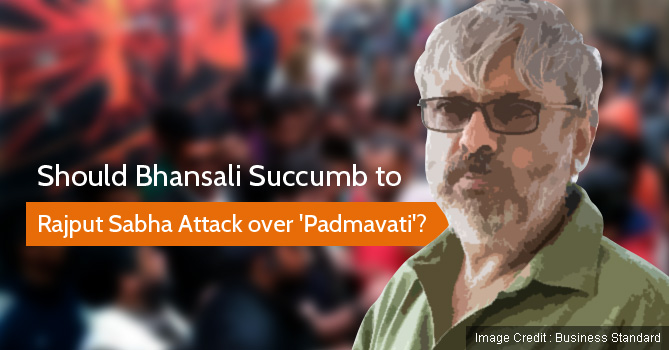Whatever happened on the sets of ‘Padmavati’ cannot be adjudged as an action of incorrigible mavericks. Rather it is seen as the doings of zealots who, in their attempt to prove others wrong, indulged in activity which ultimately became unacceptable to many, including righteous persons of the society. By assaulting the country’s very popular film director Sanjay Leela Bhansali, members of Karni Sena, a radical Hindutva group in Rajasthan, may have earned some supports from a section of society, but the damage they have brought to the country and its image is irreparable.
Moreover, it has made the state’s famous and seductive slogan “padharo mhare desh” look hollow and ineffective. Rationale demanded that Karni Sena should have, before assaulting Bhansali, his team members and damaging sets of his upcoming Hindi film ‘Padmavati’, at Rajasthan’s Jaigarh Fort where shooting was going on, tried to know the truth. Instead, they ran amok and did what they felt justified. In their act they forgot that they trampled on freedom of expression enshrined in the country’s constitution.
They forgot that we live in a civilized society and the country’s law is there to take care of absurdity if ever it gets portrayed in a film. However, after initial furore and chest thumping by some people in Rajasthan and other parts of the country, sanity has prevailed among members of Karni Sena and the state’s Rajput Sabha. This happened after Bhansali Productions has made it clear that there is no romantic dream sequence that is unbecoming of the stature of Padmavati who was a legendary 13th-14th century queen of Chittor.
What triggered hullabaloo and consequent assault on Bhansali?
A rumour was spread that Sanjay Leela Bhansali, who has directed famous films like ‘Devdas’, ‘Black’ and ‘Bajirao Mastani’, was shooting a Hindi film ‘Padmavati’ at Jaigarh Fort in Jaipur and that he was distorting the history for sake of commercial benefits.
It said that the film has a dream sequence wherein Rani Padmavati is seen having an intimate relationship with Alauddin Khilji, a Sultan who ruled Delhi during early 14th century. In that film, the role of Padmavati is played by popular actress Deepika Padukone and that of Alauddin Khilji by actor Ranveer Singh. Contention of Karni Sena and members of the Rajput community is that Rani Padmavati self-immolated herself along with other women of the Chittor fort when they heard that Alauddin Khilji was marching ahead to overrun the fort. Therefore, in their eyes, Bhansali was presenting a distorted historical fact in his film.
Does history support Karni Sena’s stand?
The tale of Rani Padmavati, the beautiful queen of Chittor King Rana Ratansen Singh has been told in ‘Padmavat’, a long Awadhi-language poem written by Malik Muhammad Jayasi, the 16th century Sufi poet. In his poem, Jayasi describes Padmavati, a perfect woman, a beautiful figure which was never even seen on the earth.
It also says that Padmavati belonged to Simhala-dvipa (today’s Sri Lanka) and that she had a talking parrot named Hiraman who read the holy books and the Vedas too. One day, Hiraman earned the wrath of the Simhala dvipa King and it flew down to Chittor where it told King Ratansen about the great beauty of Padmavati. Hearing it, the Chittor King travelled to Simhala-dvipa where he married Padmavati and after a long journey filled with trials and adventure, brought her to Chittor.
Jayasi’s poem ‘Padmavat’ then narrates that in Ratansen’s court lived a sorcerer called Raghav Chaitanya. After he was caught invoking black magic, King Ratansen banished him from his kingdom. Filled with revenge and hatred, Raghav Chaitanya moved into the court of Alauddin Khilji in Delhi and told him about Padmavati’s beauty. Following this, the Sultan marched towards Chittor with aim to acquire the queen. In his tryst to lay siege over the fort, which took several months, Alauddin Khilji killed tens of thousands of people.
But before he could enter into the fort to capture Padmavati, the queen and other Rajput women committed ‘Jauhar’, a self-immolation practice which Rajput women usually undertook to escape tyrants in the early days. Some historians support it while others term it merely a historical fiction with no supportive facts.
Is ‘Padmavat’ a fictional work?
Talking to an English daily, noted historian Prof. Irfan Habib said Jayasi penned down the book, ‘Padmavat’ during Akbar’s reign around 1550 A.D., wherein the poet mentioned about Alauddin Khilji, a Delhi-based king who existed from 1296 to 1316. As such, under historian Irfan Habib’s eyes, the story has no link with history.
Taking leaves out of Amir Khusrau’s chronicle, some experts say that Khusrau, one of the scholarly gems of the late 13th and early 14th century who had accompanied Alauddin Khilji to his expansionist campaigns outside Delhi, made no mention of ‘Jauhar’ at Chittor.
However, he referred to Rajput women’s self-immolation during Khilji’s conquest of Ranthambore, which preceded the Chittor campaign. Some other historians, believing in ‘Padmavati’ story, maintain that Alauddin’s march towards Chittor was more out of desire to expand the geographical area of his administration than a lovesick man’s quest for a beautiful woman.
Their understanding is that even though some characters, events and situations mentioned in the book, ‘Padmavat’ are based on facts, its depiction of talking parrot, adventures of the Chittor King and Padmavati, and their dare devil journey from Simhala-dvipa to Chittor is not without their share of fantasy.
Do film makers mix fiction with history?
There are several film makers who have experimented with their art while portraying historical works. From ‘Mughal-e-Azam’ to ‘Asoka’ to ‘Jodha Akbar‘ and ‘Mohenjo Daro‘ to ‘Bajirao Mastani‘, every film has been accused of distorting history. Artistic presentation of historical characters or situations has often clashed with nationalistic sentiments, caste and clan prejudices. And, this is what has happened with Bhansali’s upcoming film ‘Padmavati’ too.
Conclusion
Submitting to Rajput Sabha and Karni Sabha’s dictates, Bhansali and his team have agreed that there will be no distortion of historical facts in the movie. But the former have also demanded that the name of the film be changed and that the film should be screened before a screening committee before its release.
Though these demands have not been met, but it shows that a few people in the country are not ready to take an art for art’s sake.




